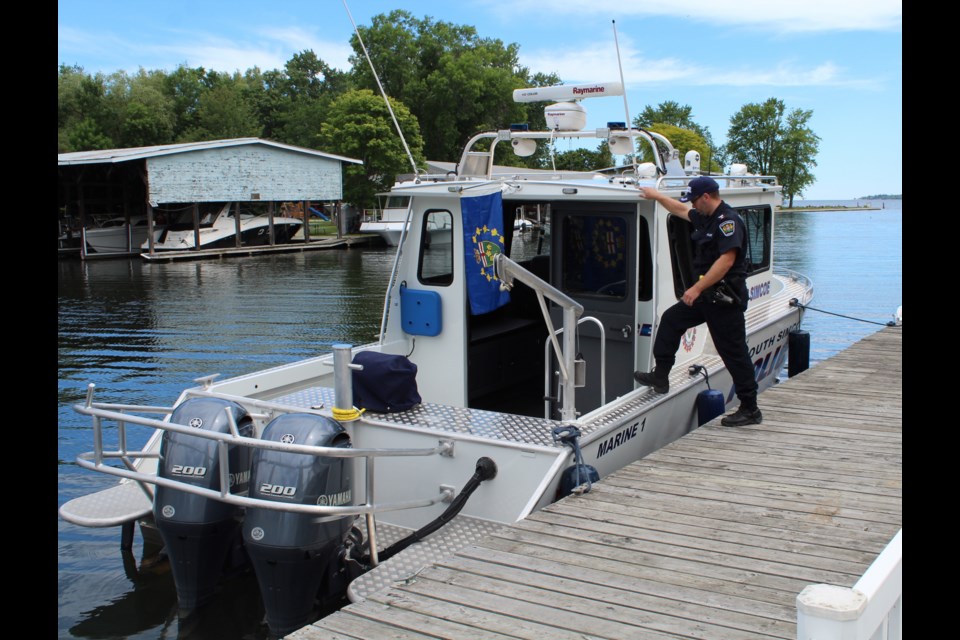Using a boat, stand-up paddleboard or “dollar-store inflatables” without a life-jacket could be a recipe for disaster, says South Simcoe police Sgt. Dave Phillips.
But it is something he sees — and tickets — all the time as a member of the South Simcoe police department's marine unit.
“It’s monthly we’re finding people in dollar-store inflatables, tubes, you name it, and they’re out there without anything to save their life. (If) it gets a leak in the middle of the lake, it’s of no value to you,” he said.
“It’s high-risk behaviour in our opinion.”
People often think the leash on stand-up paddleboards connected to their ankles will protect them, Phillips added, but it will not keep them afloat if they fall and hit their heads.
“A life-jacket is of very little value to you if you’re not wearing it," he said. "(Otherwise), you’re clinging to the side of a sinking vessel or some debris, waiting for someone to come get you. That’s crazy. It’s preventable.
“Very quickly water is very fatal to humans. Lake Simcoe is probably good for a drowning death every year.”
Earlier this month, two men were rescued after their boat capsized in high waves in Cook’s Bay in Innisfil. They managed to put on their life-jackets only after the boat went down — something very difficult to do, according to police.
Last fall, a fisherman drowned in the same frigid waters.
It took a week of searching in sleet-like conditions to find him, Phillips said.
“If they had a life-jacket, it would’ve been a different outcome,” he said.
July 15-21 is National Drowning Prevention Week.
Phillips said anyone who spends time around water should know how to swim, and people need to give more thought about their safety on the water.
“(People think), ‘What’s going to happen? It’s a canoe.’ That story plays out every year,” he said, adding people should run through a checklist before going on the water.
This includes putting on a life-jacket that is in good shape, checking the weather forecast and having safety equipment available.
A person operating any type of watercraft without a life-jacket will get fined $200, and $100 for each additional person with them who doesn't have one, Phillips said.
“If things don’t go well for someone, they’re left with very few tools to help save their life. Life-jackets could save numerous lives if people just wore them,” he said.
For Iain Craig, the organizer of Marsh Mash, a 40-year-old marathon canoe race in Bradford West Gwillimbury, water safety is personal.
A lifelong paddler, Craig has had several near-drowning experiences and, while working as a teacher, he took dozens of kids on canoe trips through Algonquin Provincial Park.
“I’m fully aware of what can happen. You want to take as many precautions as you can,” he said. “If the first time a kid tips a canoe (is on a school field trip), somebody’s made a mistake.”
Over the years, local school boards have tightened their rules on canoe trips, he said, citing the drowning death of 15-year-old Jeremiah Perry in Algonquin Provincial Park last year.
The boy did not know how to swim and had failed a swim test before the trip, according to media reports.
Craig also pointed to the 1978 canoeing tragedy on Lake Temiskaming, where 12 boys and one adult — all wearing life-jackets — died on a school trip when water overturned the group’s four canoes.
“That set high-school canoeing and canoe trips back a decade,” he said, adding people should know how to swim and what to do in an emergency before they get into the water.
“You shouldn’t be falling into Kempenfelt Bay in choppy water because someone says you have a PFD (personal flotation device).”
While Craig wants kids to be safe on the water, he said he worries new restrictions on school canoe trips will keep kids away from it and make them afraid.
“If swimming lessons were free, that would have a huge (effect). If they’re not free they should be the next best thing to free,” he said.
Craig said he would like to see water safety incorporated more into the school curriculum, such as by having it taught in geography classes when discussing bodies of water, or by allowing kids to get their Bronze Medallion in swimming through gym class.
“You (have to) make them aware. No better time to do that than elementary school,” he said.
Craig now works with a group called Keep Kids Paddling to encourage school boards and parents to take their kids canoeing, safely.
“It’s a shame if that disappears. We’re short-changing kids the experience. Parents need to get into the water and work with their kids and show them there’s nothing to be afraid of,” he said.
“You can’t get away from the water. Canadians are always around water.”



